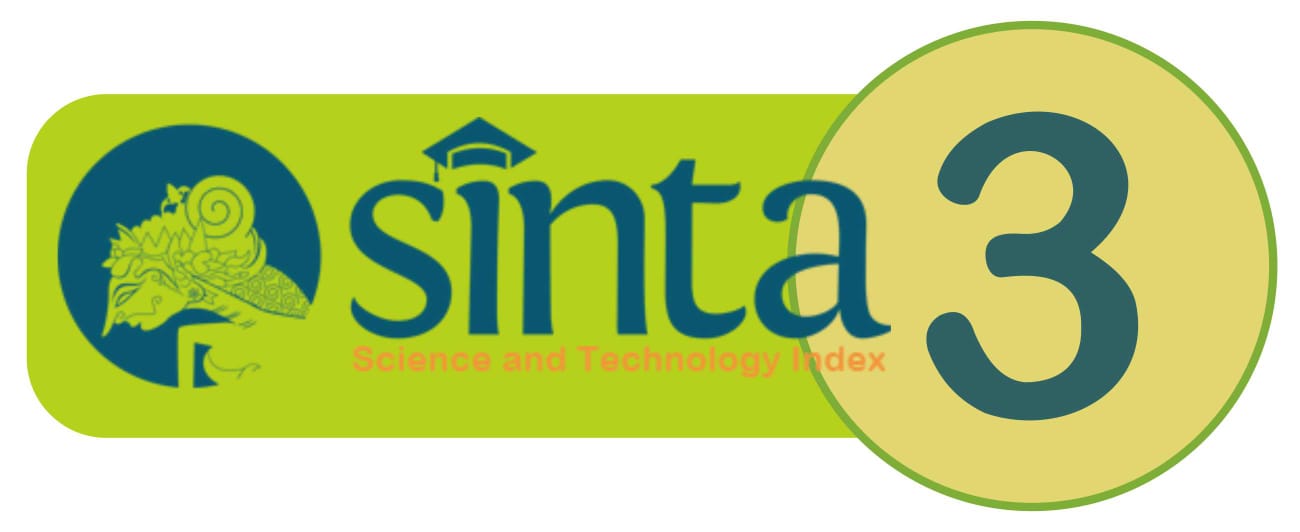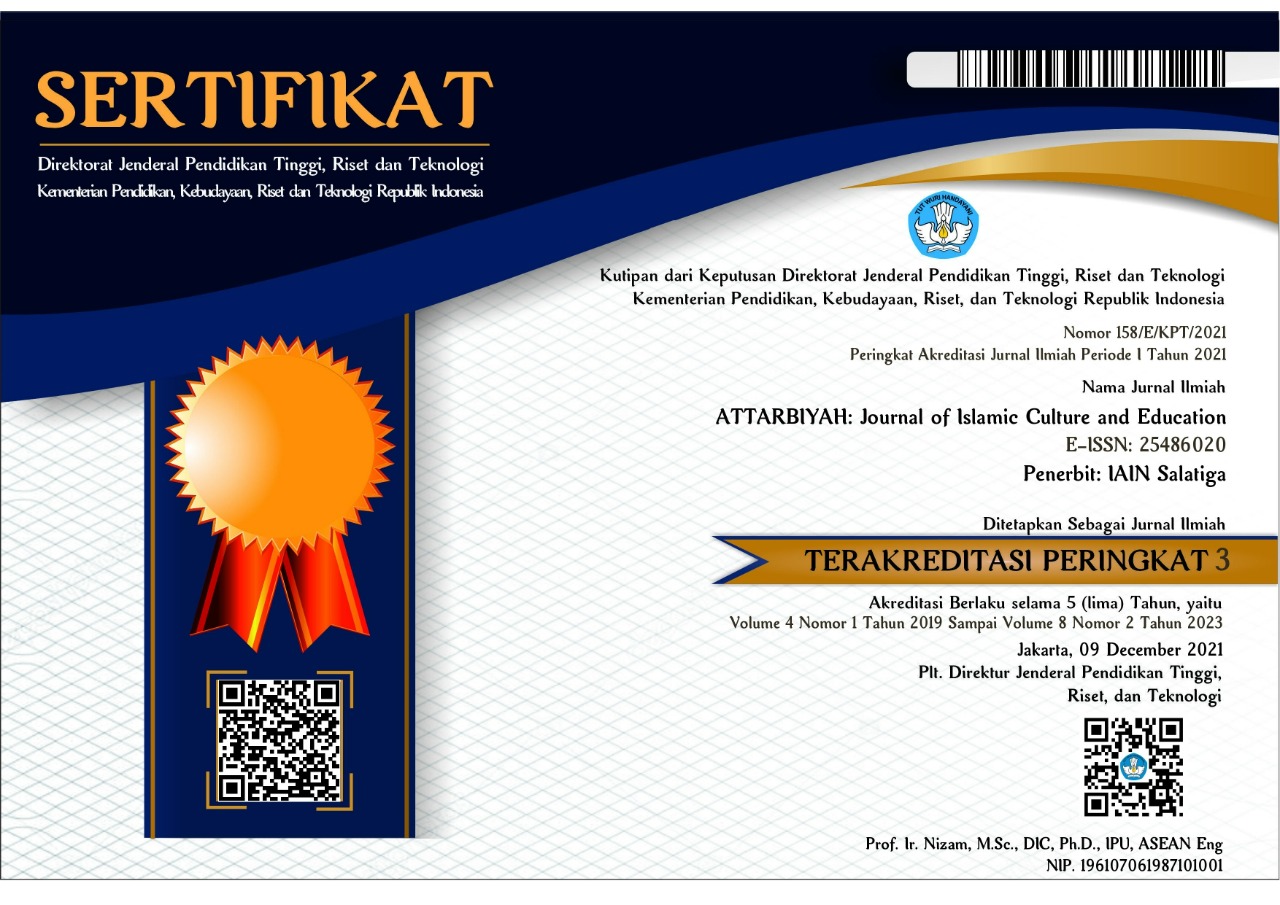Development of e-LKPD based on high order thinking skills (HOTS) to improve cultural literacy in folklore text material
Abstract
This research aims to develop hots-based e-LKPD as teaching material for learners to be able to understand the text material of folklore well. The method used in this research is the development (R&D) of Borg and Gall which is simplified into seven stages, namely (1) potential and problems; (2) data collection; (3) product development; (4) product evaluation; (5) revision; (6) product trials; and (7) final revisions. Expert validation results show this HOTS-based e-LKPD has been worth using with revisions. The results of the trial showed that as many as 70% of students were able to solve high-level questions, 80% of students solved moderate-level questions, and 90% of students solved low-level questions. The results of the response questionnaire showed e-LKPD in the high category so that the percentage of ministry was obtained by 87.4% with very interesting criteria on all aspects measured, namely material aspect 87.2%, presentation aspect 86%, and language aspect 89%. The overall number of such percentages reaches very high criteria so, it can be concluded that the e-LKPD developed is very interesting and makes it easier for students to understand the material.
Keywords
Full Text:
PDFReferences
Bakri, F., Permana, H., Wulandari, S., & Muliyati, D. (2020). Student Worksheet with AR Videos: Physics Learning Media in Laboratory for Senior High School Students. Journal of Technology and Science Education, 10(2), 231. https://doi.org/10.3926/jotse.891.
Baynes, R., & Austin, J. (2012). Indigenous Knowledge in the Australian National Curriculum for Science: from Conjecture to Classroom Practice. Paper Presented at the 5th Biennial International Indigenous Development Research Conference. New Zealand: Auckland.
Borg, W. R., & Gall, M. D. (2003). Educational Research: An Introduction (7th ed). New York: Longman.
Darmawan, D., & Wahyudin, D. (2018). Model Pembelajaran di Sekolah. PT. Remaja Rosdakarya.
Derlina, P. I. K. (2016). Kemampuan Pemecahan Masalah Siswa SMA dalam Model Pembelajaran Berbasis Masalah dengan metode Know-Want-Learn (KWL). Jurnal Saintech, 8(3), 1–10.
Dwi. (2017). Pengembangan Lembar Kerja Siswa (LKPD) dengan Pendekatan Santifik untuk Meningkatkan Hasil Belajar Mata Pelajaran IPS Bagi Siswa Kelas IV Sekolah Dasar. Universitas Negeri Surabaya.
Haryonik, Y., & Bhakti, Y. B. (2018). Pengembangan Bahan Ajar Lembar Kerja Siswa dengan Pendekatan Matematika Realistik. MaPan: Jurnal Matematika dan Pembelajaran, 6(1), 40–55. https://doi.org/10.24252/mapan.2018v6n1a5.
Heong, Y. M., Othman, W. B., Yunos, J. B. M., Kiong, T. T., Hassan, R. Bin, & Mohamad, M. M. B. (2011). The Level of Marzano Higher Order Thinking Skills among Technical Education Students. International Journal of Social Science and Humanity, 1(2), 121–125. https://doi.org/10.7763/ijssh.2011.v1.20.
Ike, L. (2014). Pengaruh Metode Pembelajaran Pemecahan Masalah Terhadap Kemampuan Kreatif Siswa Dalam Menyelesaikan Soal Pengolahan Data Kelas IV SD”. Universitas Negeri Surabaya.
Kemendikbud. (2017). Materi Pendukung Gerakan Literasi Budaya dan Kewargaan. Jakarta: Kementerian Pendidikan dan Kebudayaan.
Masrukhi. (2012). Membangun Karakter Berbasis Nilai Konservasi. Indonesian Journal of Conservation, 1(1), 20–29. https://doi.org/10.15294/ijc.v1i1.2061.
Muslich, M. (2010). Text Book Writing: Dasar-Dasar Pemahaman, Penulisan, dan Pemakaian Buku Teks. Yogyakarta: Ar-Ruzz Media.
Pannen, P., & Purwanto. (2001). Penulisan Bahan Ajar. Jakarta: Pusat Antar-Universitas untuk Peningkatan dan Pengembangan Aktivitas Intruksional Direktorat Jenderal Perguruan Tinggi.
Prastowo, A. (2015). Panduan Kreatif Membuat Bahan Ajar Inovatif. Yogyakarta: Diva Press.
Rita, N. J. (n.d.). Four Essential Rules of 21st Century Learning.
Roesminingsih, & Susarno, H. L. (2015). Teori dan Praktek Pendidikan. Surabaya: Bintang Surabaya.
Sagita, L., Widagsa, R., & Dwipa, N. M. S. (2018). Developing Bilingual Scientific Worksheet For Indefinite Integral. , 9(2), . https://doi.org/. Journal on Mathematics Education, 9(2), 249–258. https://doi.org/10.22342/jme.9.2.5401.249-258.
Subekti, M. A. S., & Suparman. (2019). Analisis Kebutuhan E-LKPD untuk Menstimulus Kemampuan Berpikir Kritis dengan Model Pembelajaran Discovery Learning. Proceedings of the Steeem 2019, 1(1), 185–192. Retrieved from http://seminar.uad.ac.id/index.php/STEEEM/ article/view/2870.
Trianto. (2014). Mendesain Model Pembelajaran Inovatif, Progresif dan Kontekstual. Jakarta: PT Kharisma Putra Utama.
Yurtyapan, E., & KandemiR , N. (2021). The Effectiveness of Teaching with Worksheets Enriched with Concept Cartoons in Science Teaching Laboratory Applications. Participatory Educational Research, 8(3), 62–87. https://doi.org/10.17275/per.21.54.8.3.
Zhang, Y., & Lin, C.-H. (2020). Student Interaction And The Role Of The Teacher In A State Virtual High School: What Predicts Online Learning Satisfaction? Technology, Pedagogy and Education, 29(1), 57–71. https://doi.org/10.1080/1475939X.2019.1694061.
DOI: https://doi.org/10.18326/attarbiyah.v6i2.81-96
Refbacks
- There are currently no refbacks.

ATTARBIYAH: Journal of Islamic Culture and Education by http://attarbiyah.iainsalatiga.ac.id/ is licensed under a Creative Commons Attribution-ShareAlike 4.0 International License
----------------------------------------------------------
ATTARBIYAH : Journal of Islamic Culture and Education IAIN SALATIGA p-ISSN: 0215-9996, e-ISSN: 2548-6020



